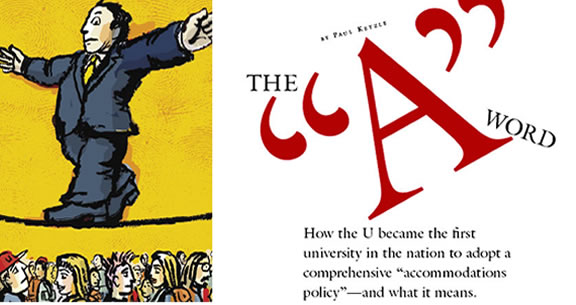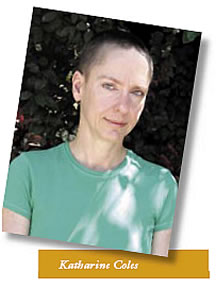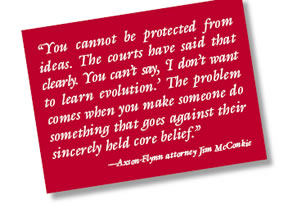
Vol. 15 No. 2 |
Fall 2005 |

Academic freedom and academic integrity (and the limits of each) are being hotly debated in state legislatures, courts, and universities all across the U.S. In some states, groups have pushed versions of a “Student Bill of Rights,” laws that would essentially allow students to “opt out” of material they find offensive. Others are pushing Intelligent Design theory into classrooms as if it were a counterweight to the theory of evolution. Still others desire alternate assignments to avoid performing vivisection and similar procedures for ethical reasons. At the center of this debate lies the question: What can teachers require of their students?
This past spring, the U’s faculty senate became a pioneer of a sort, formally adopting the nation’s first full-fledged accommodations policy. Not that it especially wanted or even had thought it needed to; in fact, most universities still don’t think they have a problem.
The U certainly didn’t. But that was before it got sued.
The story of the U’s new accommodations policy is intertwined with that of Christina Axson-Flynn, a promising young thespian who auditioned for admission to the U’s prestigious Actor Training Program in 1998. During her interview, she expressed strong reservations about using profanity, including taking the Lord’s name in vain. The faculty who interviewed her, including interim program chair Sandy Shotwell, felt they had made it clear that as a participant of a pre-professional program, she would be expected to continue to “explore” issues like this.
And even after Axson-Flynn began taking acting classes at the U, there didn’t appear to be a significant problem. It was true that on several occasions she made modifications in her performance of texts, though the program generally discourages those kinds of alterations. Axson-Flynn acknowledges that she was never punished for these changes, but claims that a meeting with the program director and other officials convinced her that she would be unable to complete the program without compromising her religious principles.
She left the ATP in the middle of her second semester, contending that she was forced out. The next January, she filed suit against her instructors and the program.
The timing couldn’t have been worse for the U. The lawsuit was part of a trifecta of controversy that swelled around the U at the turn of the millennium. In addition to the Axson-Flynn case, accusations that the U’s medical school was engaging in discriminatory practices against members of the Church of Jesus Christ of Latter-day Saints ruffled more than a few feathers on Capitol Hill. Also, a well-publicized debate over the U’s policy of prohibiting concealed weapons on campus helped foment an impression that the U was an institution living by its own rules. Some legislators even threatened financial retaliation against the state’s flagship institution.
 Early
on in the process, the University of Utah decided against contesting the
narrative Axson-Flynn laid out, not because it agreed with her characterization
or recounting of the facts, but because the U’s attorneys believed
it would more easily win the case by arguing the larger issues, not the
facts they disputed.
Early
on in the process, the University of Utah decided against contesting the
narrative Axson-Flynn laid out, not because it agreed with her characterization
or recounting of the facts, but because the U’s attorneys believed
it would more easily win the case by arguing the larger issues, not the
facts they disputed.
From a legal standpoint, this choice paid off—at least at first. The federal judge in the case agreed with the U’s argument that curricula should be determined by the instructors and that a student’s free speech rights and rights of expression do not extend to allowing that student to refuse to learn material that is part of a curriculum.
But in the spring of 2004, the Tenth Circuit Court of Appeals remanded the case back for trial on issues of fact (even though the U had chosen not to contest them). One central question was whether there was a pretext of discrimination in the ATP’s curriculum (i.e. whether the intended purpose of the requirement for students to perform texts as written and assigned was to discriminate against certain students’ religious beliefs). The U needed to show, in essence, that the requirement had an independent relationship to a legitimate pedagogical goal.
On the major issues of law, however, the U had already won the judgment it desired. The courts upheld the idea that teachers are not compelled by the First Amendment to alter an assignment to accommodate a student’s opinion. More important, the assignment chosen by the instructor need not be the best choice, merely “reasonably related to legitimate pedagogical concerns.” (Anything less, the courts reasoned, would basically give students “veto power over curricular requirements.”) By clearly supporting the rights of instructors to determine the content of the courses they teach, the courts have raised the bar for those who desire to alter that content—which is why many were shocked to see the announcement in May of that year that the U, rather than going to trial, had reached a settlement agreement with Axson-Flynn.
 Faced
with another return to the courtroom, the U saw little to be gained from
continuing. U Legal Counsel John Morris points out that every time the
University steps into court, a flurry of press, mostly negative, results.
The only advantage to going to trial would have been to the defendants,
like Shotwell, who literally were never given their day in court or the
opportunity to refute Axson-Flynn’s allegations.
Faced
with another return to the courtroom, the U saw little to be gained from
continuing. U Legal Counsel John Morris points out that every time the
University steps into court, a flurry of press, mostly negative, results.
The only advantage to going to trial would have been to the defendants,
like Shotwell, who literally were never given their day in court or the
opportunity to refute Axson-Flynn’s allegations.
The U worked with Jim McConkie JD’73, Axson-Flynn’s attorney, to reach a settlement, one explicitly stating that the U admitted no wrongdoing. Under the agreed terms, however, Axson-Flynn was reimbursed her student and legal fees and was offered the opportunity to re-enroll in the U program, which she declined.
But the most significant element of the settlement was the agreement by the U to develop a policy, to be approved by the faculty senate, to deal with requests for religious accommodation.
 That
process began with the appointment of a faculty committee to draft the
policy, chaired by former Faculty Senate President Katharine Coles PhD’90.
The purpose of the policy was multifold: It needed to provide a guide
to the faculty and students for what was expected of them; it had to provide
a process for dealing with objections; it needed to fit within the context
of the Tenth Circuit Court’s decision; and it had to do all these
things while also balancing both academic freedom and academic integrity.
That
process began with the appointment of a faculty committee to draft the
policy, chaired by former Faculty Senate President Katharine Coles PhD’90.
The purpose of the policy was multifold: It needed to provide a guide
to the faculty and students for what was expected of them; it had to provide
a process for dealing with objections; it needed to fit within the context
of the Tenth Circuit Court’s decision; and it had to do all these
things while also balancing both academic freedom and academic integrity.
This policy would be the first of its kind in the nation. Schools that had addressed the issue usually did so in a brief statement, not a full-fledged policy like the one the committee found itself faced with crafting. The committee also decided that, to be consistent with the values of the University, the policy would have to apply not only to religious beliefs, but to other deeply held ethical and moral principles as well.
As part of the development process, the committee began to hold open hearings to register the opinions of faculty, students, administrators, community members—those who would be most affected by any policy that was put into place.
 The
settlement with Axson-Flynn stipulated that the U had to adopt a policy—but
it did not specify what the policy needed to be. The initial impulse of
the committee was simply to allow no accommodations at all, for any reason.
But based upon the feedback they received, they decided that, in addition
to this right of refusal, the policy would allow instructors the possibility
of granting an accommodation, but only if a reasonable alternative assignment
could be found that met the same goals as the original.
The
settlement with Axson-Flynn stipulated that the U had to adopt a policy—but
it did not specify what the policy needed to be. The initial impulse of
the committee was simply to allow no accommodations at all, for any reason.
But based upon the feedback they received, they decided that, in addition
to this right of refusal, the policy would allow instructors the possibility
of granting an accommodation, but only if a reasonable alternative assignment
could be found that met the same goals as the original.
In the event that a student’s request is turned down, the policy then offers the option of appealing to the appropriate school’s dean. The dean, in turn, can only overturn the instructor’s decision to refuse the accommodation based on two standards: first, if that decision is, in the court’s own language, arbitrary and capricious.
“That’s a legal standard, and it’s very high,” Coles points out, noting that the committee’s choice of language was carefully considered. “It will be very difficult to reach.”
Much easier to reach will be the second standard, which states that the material in question cannot be illegal.
If anyone on the committee expected that it would be smooth sailing once the proposal was brought for consideration before the full senate, the vocal opposition they found there soon dispelled that idea.
Coles and Morris presented, discussed, and defended the policy to the senate for the first time in January 2005. A group of senators and other faculty members, mostly from the hard sciences, expressed concern that altering course content for reasons that have nothing to do with a “legitimate pedagogical goal” was, by definition, an abdication of the U’s commitment to academic integrity.
 Greg
Clark, an associate professor in the department of bioengineering, may
be the policy’s most vocal critic, though his opinion is shared
by many of his colleagues. Speaking passionately at the senate hearings
in January, Clark urged the body to amend or reject the proposed policy.
Greg
Clark, an associate professor in the department of bioengineering, may
be the policy’s most vocal critic, though his opinion is shared
by many of his colleagues. Speaking passionately at the senate hearings
in January, Clark urged the body to amend or reject the proposed policy.
But after three months of debate, the senate finally approved the policy with a two-thirds majority in March, and it officially went into effect at the start of the fall 2005 semester.
At the heart of the disagreement among faculty, though, have been issues of academic freedom and academic integrity and how best to balance the two.
Clark argues that altering course content is essentially the same as altering a course grade or changing the results of an experiment for non-academic reasons. A violation of academic integrity occurs, he says, when changes are made because the material is “not in agreement with [the student’s] personal beliefs.”
Academic freedom, Clark believes, does not extend to considerations unrelated to “legitimate academic purposes of the course.”
“Academic integrity cannot exist in the absence of freedom,” Coles counters, though she admits that the former does not and cannot guarantee the latter. But policies like the ones proposed by Clark and other critics, she argues, would remove the instructor from the position of final arbiter of course content. “I have an enormous faith in the ability of the faculty to manage this freedom in a responsible way,” she says.
Critics of the policy believe it retreats from the court’s decision by allowing legitimate pedagogical content to be “censored” due to conflicts. As an example, Clark points out that legitimate academic findings about life on Earth, or of the earth itself, will in some cases conflict with—and thus impose a severe burden on—the sincerely held core beliefs of some students.
“Nonetheless it is inappropriate to censor, omit, or soften evolutionary facts simply because they conflict with or burden such sincerely held beliefs,” he says.
But supporters of the policy maintain that it does not allow instructors to do this. Coles says: “You may only grant an accommodation if there is an alternative that achieves the same goal. This isn’t about censoring content. The policy explicitly prohibits such accommodations.”
And oddly enough, one person who rejects Clark’s characterization is Axson-Flynn attorney Jim McConkie. When asked what the instructor should do if a student refused to learn evolution, McConkie minces no words.
“Give ’em an ‘F’,” he says. “The policy is clear about the difference between actions and ideas.” In fact, he points out, this difference lies at the heart of the Axson-Flynn complaint. “You cannot be protected from ideas. The courts have said that clearly. You can’t say, ‘I don’t want to learn evolution.’ The problem comes when you make someone do something that goes against their sincerely held core belief.”
Though now approved, it’s obvious that the debate surrounding the U’s new accommodations policy is not over. In fact, as part of the senate discussion, an amendment was placed in the policy itself requiring that it be revisited in two years to evaluate its impact.
As for whether the policy will protect the U against future lawsuits like Axson-Flynn’s, the jury is still out. McConkie, who has read the U’s new accommodations policy, believes it satisfies the conditions of the settlement. But the U’s contention that accommodations can be decided on a class-by-class basis is one aspect of the policy that has not yet been tested. McConkie makes the case that once an accommodation has been considered in one instance, all others on campus must as well.
“You have a policy of granting accommodations. You can’t have someone in one class being given an exemption and another student in another class being denied.”
John Morris strongly disagrees, citing the court’s affirmation of the right of instructors to determine course content. Though no case law specific to this situation currently exists, he asserts that it is defensible.
For the moment, though, no one can say for certain how the courts would rule; and if someone decides to test the boundaries of this policy, the U may someday soon find itself once again arguing its case for academic freedom, battling public perceptions from the courthouse steps.
—Paul Ketzle PhD’04 is an English instructor in the University of Utah’s LEAP program and a contributing editor to the scholarly journal Western Humanities Review.
What
the Policy Does
• Treat requests for scheduling accommodations and content accommodations
separately
• Leave faculty in charge of establishing the content of the curriculum
and of specific courses
• Require students to understand and be able to articulate ideas and theories that are important to the discourse within and among academic disciplines whether or not they agree with or believe those ideas or theories
• Place the burden on the individual student for determining when and if the content of a course conflicts with a sincerely held core belief
• Provide a procedure to follow in case a student requests a scheduling or content accommodation
• Permit instructors to deny any request for a content accommodation as long as the course content has a reasonable relationship to a legitimate pedagogical goal
• Allow instructors to grant any such request only if a reasonable alternative means of satisfying the curricular requirement is available, that alternative is fully appropriate for meeting the academic objectives of the course, and the instructor considers all such requests during the same course equally
What
the Policy Does Not Do
• Require faculty to alter course content
• Permit students to “opt out” of course assignments
for religious or any other reason
• Oblige faculty to grant accommodation requests, except in those
cases when denial would be illegal or arbitrary and capricious
• Require faculty to predict what course content may confl ict with a student’s deeply held core beliefs
• Require faculty to judge either the sincerity or the validity of a student’s beliefs
• Guarantee that all students will be able to complete all classes or majors at the University
—Accommodations
Policy Drafting Committee